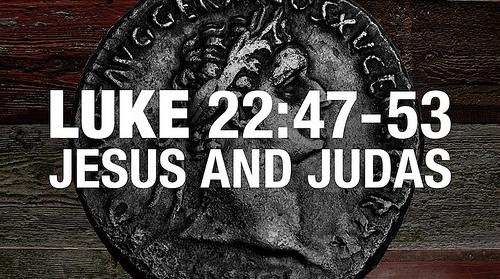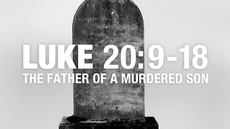 From the Oct. 16 sermon, "Jesus and Judas," preached by Pastor Mark out of Luke 22:47–53:
From the Oct. 16 sermon, "Jesus and Judas," preached by Pastor Mark out of Luke 22:47–53:
On Mars Hill’s 15th birthday, we examine a sobering text of Scripture and lessons from the life of Judas. Judas was no victim. Judas’ desire was to betray Jesus, and Satan came and empowered that desire. The Bible doesn’t tell us why Judas did what he did; it leaves the question hanging in the air, "Could I do the same?" Each of us must humbly, soberly pray for God’s grace to not be a Judas.
Judas had remorse, but not repentance. He felt bad, but he never changed. So, the Bible says that he had remorse, but rather than repenting—and repenting is where you tell people you’re sorry, and you own what you’ve done, and you tell God you’re sorry, and you own what you’ve done—he just had remorse. All right, this is some of you. You cry, and you feel bad, and you grieve the consequences, but you don’t hate your sin, and you don’t bring it to God and the people you’ve offended, and that leads to discouragement, and depression, and despair. … That’s remorse, not repentance. It’s not enough to just feel bad. You’ve got to bring it to God, and you need to change by the grace of God. Judas never got there. Peter did; Judas didn’t.
Judas was no victim. Judas’ desire was to betray Jesus, and Satan came and empowered that desire. This is like a man who is in a boat and wants to proceed toward a destination, and he’s in the boat, and he has the map, and he has the compass, and he is determined to row hard and strong toward his destination. And it’s as if Satan then sends a stiff breeze into the sail to help him get there more quickly, but it doesn’t mean that that man is a victim being taken in a direction that he does not want to go. Rather, his desires are being empowered by the enemy of God. This is exactly what Acts 1:25 says. It says, quote, "Judas turned aside to go to his own place," that Judas knew exactly what he wanted to do, and Satan wanted to help him do it. And let me say this. Satan doesn’t make us do things we don’t want to do, but he empowers us to do things that God doesn’t want us to do. If those are the things that we want to do, we are opening ourselves up to our enemy. I’m not saying you’re going to lose your salvation if you’re a Christian. I’m not saying that you’re going to be demon-possessed. I’m not saying that at all, but I’m saying that our sin nature has foolish, wicked, deadly desires. The world in which we live provides evil opportunities, and Satan and demons will like to empower those evil desires to do deadly things in the world that God made. … We cannot look at the story and say, "He’s a bad guy, I’m a good guy; I’m so glad I’m not like Judas," because that’s how we get into serious trouble. We lack humility and sober-mindedness, and instead we have pride and arrogance. In the grace of God, we should avoid that as much as possible. I believe sometimes the most deadly examples are some of the most powerful examples, and sometimes those are negative examples, and Judas serves as a negative example. It’s God’s way of saying, "You are in danger; stay close to my Son."Why just sitting under good Bible teaching isn't enough, after the jump:
I want to thank you for being a church that says, "We love the Bible. Help us learn the Bible. Teach the Bible." I mean, we’re at Luke #94. We’ve grown by a few thousand people in Luke. All right, no gimmicks, no tricks, Bible teaching, and the people of God in Community Groups. But sitting under Bible teaching can give the impression that you are a Christian and are growing spiritually. Jesus’ brother, James, says it this way in the book bearing his name: "Do not merely listen to the Word and," what? "Deceive yourselves. Do what it says." See, you need to hear the Word of God and obey the Word of God; otherwise, you’re prone to deception. "I’m very knowledgeable. I’m very spiritually mature." Are you obeying? Are you believing what you’re told? I tell you all the time, "This is the Word of God. Jesus is the Son of God. He is God among us. He lived without sin. He died on a cross, in our place, for our sins. He was buried. Three days later he rose from death. He is ascended on high. He is coming again to judge the living and the dead. He is Lord. He is King. He is God. He is Christ. He is friend. He is Savior. He is all!" But you have to believe that. Do you believe that? I really want you to believe that. See, Judas heard that, but he didn’t believe that. Jesus gave him all the information, and Judas didn’t respond with faith. He didn’t trust a word of it. Sitting under the best Bible teaching has the potential of merely increasing your self-deception. It also increases the opportunity of experiencing sanctification, growing in grace. And whether it becomes self-deception or sanctification is contingent upon you believing and obeying what the Bible actually teaches. I’m not saying that I’m always right, and that I never get it wrong. And I want to do my best. So, even take what I say, like the Bereans did, take it to the Bible. Check it and make sure it’s what the Bible teaches. And if I’m wrong, help me to repent and do a better job, because at the end of the day, we want the truth to be told, we want Jesus to be loved, and we want people to be served.Next week, Luke #95, "Jesus, the Son of God," preached out of Luke 22:63–71.













